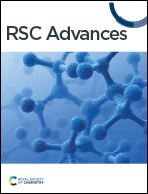
RSC Advances
Subject area
Inorganic materials articles published in the last
6 months

Effective separation of dyes/salts by sulfonated covalent organic framework membranes based on phenolamine network conditioning
This study developed a modified polyacrylonitrile (PAN) membrane controlled by a phenol–amine network and enhanced with a sulfonated covalent organic framework (SCOF), aimed at improving the efficiency of textile wastewater treatment.

RSC Adv., 2024,14, 14593-14605
https://doi.org/10.1039/D4RA01736F
Advanced photocatalytic materials based degradation of micropollutants and their use in hydrogen production – a review
The future directions of photocatalytic degradation of micropollutants (pharmaceuticals, dyes, pesticides, etc.) and its role in green fuel production from wastewater are discussed with several examples of modern photocatalysts.

RSC Adv., 2024,14, 14392-14424
https://doi.org/10.1039/D4RA01307G
MOF/graphene oxide based composites in smart supercapacitors: a comprehensive review on the electrochemical evaluation and material development for advanced energy storage devices
Driving towards sustainable energy solutions: harnessing metal–organic framework/graphene oxide composites to propel high-efficiency smart supercapacitors.

RSC Adv., 2024,14, 14311-14339
https://doi.org/10.1039/D4RA01027B
A review on MOFs synthesis and effect of their structural characteristics for hydrogen adsorption
Climate change is causing a rise in the need to transition from fossil fuels to renewable and clean energy such as hydrogen as a sustainable energy source.

RSC Adv., 2024,14, 14233-14253
https://doi.org/10.1039/D4RA00865K
Elucidating the performance of hexamethylene tetra-amine interlinked bimetallic NiCo-MOF for efficient electrochemical hydrogen and oxygen evolution
This study investigates the electrocatalytic water splitting capabilities of hexamethylene tetra-amine-linked NiCo-MOF, synthesized via hydrothermal approach. It reveals low overpotentials of 274 mV and 330 mV with Tafel slopes of 78 mV dec−1 and 86 mV dec−1 towards HER and OER respectively.
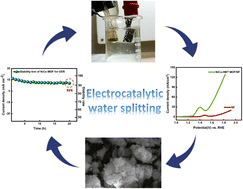
RSC Adv., 2024,14, 13837-13849
https://doi.org/10.1039/D4RA00340C
Enhanced photocatalytic performance of ZnO under visible light by co-doping of Ta and C using hydrothermal method
C, Ta-co-doped ZnO nanoparticles (Eg = 2.88 eV), prepared by hydrothermal method, were used as a photocatalyst under visible light to remove organic contaminants in aquatic environments.

RSC Adv., 2024,14, 12954-12965
https://doi.org/10.1039/D4RA00579A
Current status of controlled onco-therapies based on metal organic frameworks
Most MOFs for controllable cancer treatment act as drug delivery vehicle and/or anti-cancer agent. Molecules with anti-cancer roles such as chemotherapies, gases, peptides or nucleic acids can be loaded into MOFs that decompose in cancer cells or in the TME to release its cargoes.

RSC Adv., 2024,14, 12817-12828
https://doi.org/10.1039/D4RA00375F
Effect of defect-healing treatment on layered silicate precursors toward well-defined crosslinked frameworks
A defect-healed layered precursor of FER-type zeolite exhibited enhanced iron atom insertion in more homogeneous environments.

RSC Adv., 2024,14, 12634-12638
https://doi.org/10.1039/D4RA01626B
Synergistic effects of β-NaFeO2 ferrite nanoparticles for photocatalytic degradation, antibacterial, and antioxidant applications
Detailed antibacterial mechanism using by synthesized β-NaFeO2.

RSC Adv., 2024,14, 12513-12527
https://doi.org/10.1039/D4RA02430C
The engineering of defect-modified boron nitride ribbons: an effective adsorbent to rapid capture for tetracycline
BN-3 with 33% N defects has the biggest adsorption rate and the adsorption capacity of 302.15 mg g−1 for TC due to the decreased the absorption energy and the dominated chemisorption.

RSC Adv., 2024,14, 11932-11938
https://doi.org/10.1039/D4RA01941E
In situ growth of Bi-MOF on cotton fabrics via ultrasonic synthesis strategy for recyclable photocatalytic textiles
CAU-17 was in situ grown on carboxymethylated cotton fabric by ultrasonication and exhibited favorable photocatalytic degradation ability.

RSC Adv., 2024,14, 11513-11523
https://doi.org/10.1039/D4RA00493K
Half-decomposition of salt-bearing dolomite
The introduction of small quantities of inorganic salts in dolomite causes its half-decomposition at 723–873 K due to the heterovalent doping effect and allows for the production of porous HCDs consisting of magnesian calcite and MgO nanoparticles.

RSC Adv., 2024,14, 11358-11367
https://doi.org/10.1039/D4RA01341G
Fabrication of samarium doped MOF-808 as an efficient photocatalyst for the removal of the drug cefaclor from water
MOFs are emerging photocatalysts designed by tuning organic ligands and metal centers for optimal efficiency.
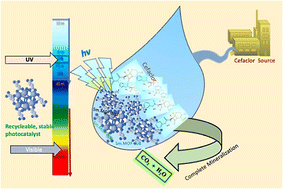
RSC Adv., 2024,14, 10736-10748
https://doi.org/10.1039/D4RA00914B
One-pot in situ synthesis of an NS-ligand co-doped metal–organic framework for the enhanced adsorption-assisted photocatalytic decontamination of metronidazole
In this study, an in situ synthesis approach is employed for the co-doping of an NS ligand into PCN-600. The resulting PCN-600-NS is explored for the photocatalytic degradation of the antibiotic metronidazole (MTZ).

RSC Adv., 2024,14, 10229-10243
https://doi.org/10.1039/D4RA00812J
Controllable fabrication of CoNi bimetallic alloy for high-performance electromagnetic wave absorption
With the coming era of artificial intelligence (AI) dominated by high-tech electronics, developing high-performance microwave absorption materials (MAMs) is imperative to solve the problem of increasing electromagnetic inference and pollution.

RSC Adv., 2024,14, 9791-9797
https://doi.org/10.1039/D3RA08896K
Synergistic effect of KI on the corrosion inhibition of a poly(diallylammonium chloride)-based cyclocopolymer containing bis-cationic motifs for mild steel corrosion in 20% formic acid
The syntheses of poly(diallylammonium chloride) (3) and its copolymers (8a–c) containing hydrophilic/hydrophobic pendants and their role in mitigating mild steel corrosion in aggressive 20% HCOOH is not frequently discussed in the literature.

RSC Adv., 2024,14, 9725-9746
https://doi.org/10.1039/D3RA08959B
Recent advancements in the specific determination of carcinoembryonic antigens using MOF-based immunosensors
Carcinoembryonic antigens (CEAs) are prominent cancer biomarkers that enable the early detection of numerous cancers.

RSC Adv., 2024,14, 9571-9586
https://doi.org/10.1039/D3RA07059J
Design and application of metal organic frameworks for heavy metals adsorption in water: a review
The growing apprehension surrounding heavy metal pollution in both environmental and industrial contexts has spurred extensive research into adsorption materials aimed at efficient remediation.
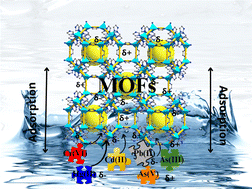
RSC Adv., 2024,14, 9365-9390
https://doi.org/10.1039/D3RA08815D
Antibacterial, antibiofilm, and antioxidant activities of two novel metal–organic frameworks (MOFs) based on 4,6-diamino-2-pyrimidinethiol with Zn and Co metal ions as coordination polymers
Two novel metal–organic frameworks (MOFs), synthesized from 4,6-diamino-2-pyrimidinethiol with Zn and Co metal ions, display antibacterial, antibiofilm, and antioxidant properties, serving multifunctionality in biological and environmental domains.
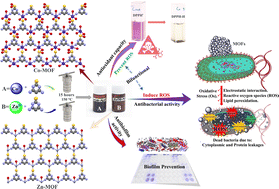
RSC Adv., 2024,14, 9080-9098
https://doi.org/10.1039/D4RA00545G
Enhancement of Pb(II) adsorptive removal by incorporation of UiO-66-COOH into the magnetic graphitic carbon nitride nanosheets
Efficient elimination of Lead (Pb(II)) from aqueous solutions has become a crucial area of focus in the wastewater treatment industry.

RSC Adv., 2024,14, 8990-9002
https://doi.org/10.1039/D4RA00364K
Functionalisation of alkali-resistant nanoporous glass via Au nanoparticle decoration using alkaline impregnation: catalytic activity for CO removal
This study demonstrates that a nanoporous glass can be decorated with Au nanoparticles using an alkali impregnation method. The resulting composite exhibits high catalytic activity in CO oxidation.

RSC Adv., 2024,14, 8214-8221
https://doi.org/10.1039/D3RA07333E
First-principles study for quasi-static growth model in FeAl intermetallic based on Wulff cluster model
A model, so called quasi-static growth model, based on the sequential addition of (sub-)monolayers in the stable surface directions has been proposed. Thus, a sequence of different Wulff shapes results in the growth process with a certain barrier.

RSC Adv., 2024,14, 8116-8123
https://doi.org/10.1039/D4RA00853G
Sustainable biofuel synthesis from non-edible oils: a mesoporous ZSM-5/Ni/Pt catalyst approach
This work examines the hydrodeoxygenation (HDO) activity of non-edible oils using a high surface area catalyst.

RSC Adv., 2024,14, 7728-7739
https://doi.org/10.1039/D4RA00346B
From bench to industry, the application of all-inorganic solid base materials in traditional heterogeneous catalysis: a mini review
Catalytic performances, structure-activity relationships of metal oxide-based and zeolite-based all-inorganic solid base catalytic materials and their major applications in non-refinery and refinery fields.

RSC Adv., 2024,14, 7468-7489
https://doi.org/10.1039/D4RA00335G
Effects of magnesium hydroxide morphology on Pb(ii) removal from aqueous solutions
Flower-like Mg(OH)2 was fabricated without using structure-directing molecules, achieving remarkable efficiency in adsorbing Pb(II) ions from water. Acid dissolution-electrolysis enables the recycling of adsorbed Pb(II) to obtain metallic lead.

RSC Adv., 2024,14, 7329-7337
https://doi.org/10.1039/D3RA08040D
Browse by Subject
- All (336 articles)
- Atomic/elemental (14 articles)
- Bioanalytical (65 articles)
- Chemometrics (30 articles)
- Crystallography (164 articles)
- Electroanalytical (57 articles)
- Imaging/microscopy (32 articles)
- Mass spectrometry (22 articles)
- Medical diagnostics (77 articles)
- Microfluidics (17 articles)
- Nanoanalysis (20 articles)
- Separation science (27 articles)
- Spectroscopy (95 articles)
- All (272 articles)
- Bioinorganic chemistry (49 articles)
- Bioorganic chemistry (27 articles)
- Biotechnology (51 articles)
- Cellular chemistry (56 articles)
- Computational (84 articles)
- Drug delivery (78 articles)
- Drug discovery (181 articles)
- Imaging/diagnostics (15 articles)
- Molecular biology (6 articles)
- Nanotechnology (44 articles)
- Natural products (30 articles)
- Pharmacology (85 articles)
- Photobiology (15 articles)
- Polymorphism (pharma) (1 article)
- Structural biology (12 articles)
- Toxicology (3 articles)
- All (555 articles)
- Biomaterials (101 articles)
- Biopolymers (99 articles)
- Carbon materials (100 articles)
- Composites (247 articles)
- Electronic materials (96 articles)
- Encapsulation (1 article)
- Energy applications (84 articles)
- Films/membranes (82 articles)
- Gels & soft matter (36 articles)
- Inorganic materials (48 articles)
- Medical materials (66 articles)
- Nanomaterials (125 articles)
- Optical materials (51 articles)
- Organic materials (55 articles)
- Polymers (133 articles)
- All (349 articles)
- Assembly (11 articles)
- Biotechnology (30 articles)
- Carbon nanomaterials (80 articles)
- Imaging/microscopy (17 articles)
- Nanoanalysis (42 articles)
- Nanocatalysis (31 articles)
- Nanomaterials (217 articles)
- Nanomedicine (43 articles)
- Nanotoxicology (55 articles)
- Optical nanomaterials (33 articles)
- Synthesis (12 articles)
- All (173 articles)
- Bioorganic (17 articles)
- Catalysis (46 articles)
- Fine chemicals (26 articles)
- Natural products (23 articles)
- Physical organic (8 articles)
- Stereochemistry (11 articles)
- Supramolecular (3 articles)
- Sustainable synthesis (35 articles)
- Synthetic methodology (100 articles)
- Total synthesis (13 articles)
- All (320 articles)
- Biophysics (2 articles)
- Charge transfer (28 articles)
- Electrochemistry (13 articles)
- Energy research (18 articles)
- Imaging/microscopy (5 articles)
- Kinetics & dynamics (40 articles)
- Materials (104 articles)
- Mechanics (34 articles)
- Nanoscience (69 articles)
- Photoscience (26 articles)
- Quantum & theoretical (90 articles)
- Simulations (23 articles)
- Single molecules (40 articles)
- Soft matter (5 articles)
- Spectroscopy (7 articles)
- Surfaces & interfaces (71 articles)